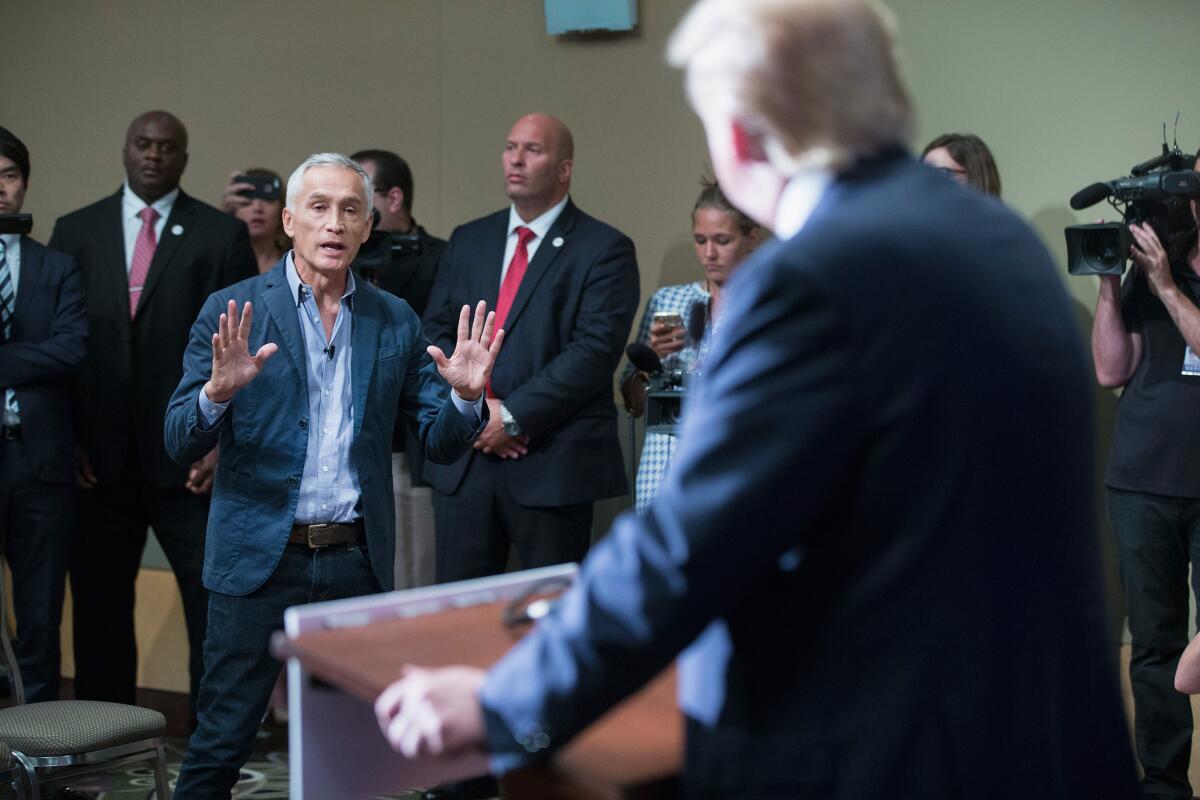Newsletter: Opinion newsletter: Time to start taking Trump seriously?

Republican presidential candidate Donald Trump fields a question from Univision and Fusion anchor Jorge Ramos during a news conference held before his campaign event. Earlier in the news conference Trump had Ramos removed from the room after he failed to yield when Trump wanted to take a question from a different reporter.
Good morning. I'm Paul Thornton, The Times' letters editor, and it is Saturday, Aug. 29. Times journalist Ruben Salazar) was killed in East Los Angeles 45 years ago today. Here's a look back at the week in Opinion.
If you ask Donald Trump, part of the U.S. Constitution is not constitutional. The Republican presidential front-runner (no, really), who once declared that birthright citizenship would probably not hold up in a court of law, wants to do away with a key protection of the 14th Amendment that immigration hard-liners regard as an unfair and unintended gift to immigrants who enter the country illegally and end up giving birth to U.S. nationals.
The Times editorial board calls this Trump-stoked campaign against birthright citizenship "shameful":
That opposition to birthright citizenship has become a mainstream position in the Republican presidential race is doubly depressing.
First, it challenges a practice that serves as an important emblem of equality and inclusion — and is firmly rooted in the Constitution. The 14th Amendment states: "All persons born or naturalized in the United States, and subject to the jurisdiction thereof, are citizens of the United States and of the state wherein they reside." In 1898, the Supreme Court construed that provision broadly when it affirmed the citizenship of a man born in San Francisco to Chinese parents. Many other countries confer citizenship on the basis of bloodlines, which makes sense when nationality is viewed in terms of ancestry or race or ethnicity. But in America, a nation of immigrants, citizenship is defined differently.
Second, the opposition is based on the canard that birthright citizenship is (in Trump's words) "the biggest magnet for illegal immigration." It's true that citizens may sponsor their parents' admission to the U.S., but only when the citizen is over 21. An undocumented parent may also be eligible for some benefits for her child and may be less likely to be deported. But these inducements are much less significant factors in illegal immigration than the desire for work and a better life.
A charitable reading of the opposition to birthright citizenship is that it's a reaction to widespread frustration over the influx of undocumented immigrants. But the best response to that concern remains comprehensive immigration reform that would both secure the borders and provide a path to citizenship for millions of otherwise law-abiding immigrants.
Trump took it hard from readers over his comments on birthright citizenship and immigration. In three of the four letters published last Saturday on Trump and immigration, Times readers lauded the country's unique and egalitarian way of conferring citizenship on all U.S.-born individuals as an example of "American exceptionalism." In Thursday's paper, one reader was particularly harsh on Trump for insulting women and immigrants while claiming that he'll still win the Latino vote.
Why not Donald Trump? Those words belong to the Week's Noah Millman, not me. Millman says the question is no longer hypothetical: "Donald Trump's greatest weakness as a candidate has always been the utter ridiculousness of the proposition. Now that he is actually a plausible contender for the presidency, either as a Republican or as an Independent, it will take more than derision to beat him. It may take an actual reason why he would be a worse president than another contender." The Week
Want to be a public school teacher? Read this Op-Ed article first. Mother Jones education writer Kristina Rizga cites the appallingly high turnover rate among new teachers to show that programs to incentivize better performance haven't worked. Her suggestion: "Perhaps giving teachers more power could make a difference where other interventions have not." L.A. Times
Teachers say high class sizes and the "children first" mentality are pushing them out the door. In letters to the editor responding to Rizga, readers who identify themselves as educators finger the No Child Left Behind Act as among the causes for high turnover. One letter writer's recommendation: "Give teachers the oxygen they need and everyone will breathe easier." L.A. Times
Sheryl Sandberg wants women to "lean in." A Times Op-Ed writer tells men to "lean out." Millennial father Steven I. Weiss calls his co-generationists hypocrites for espousing all the right beliefs about gender equality but failing to split the chores of parenting between mother and father more evenly. L.A. Times
Violent crime in Los Angeles is going up, and it might be connected to a national ill. Joe Domanick writes that the sudden reversal in the city's years-long decline in robberies and assaults might be due to more honest record keeping by the LAPD or the heroin epidemic finally spreading to Southern California. But he suggests a more troubling, possibly durable reason: "Something may be happening akin to the eras of the Watts riots of 1965, the high-crime crack war years of the 1980s and early '90s, and the 1992 Los Angeles riots. And it's this: A new Gilded Age of obscene wealth, stunning, low-wage income disparity and grinding poverty have come together to make ghetto and barrio life ever more desperate." L.A. Times
Have feedback or something else to share? Email me at paul.thornton@latimes.com.
Get the L.A. Times Politics newsletter
Deeply reported insights into legislation, politics and policy from Sacramento, Washington and beyond. In your inbox three times per week.
You may occasionally receive promotional content from the Los Angeles Times.




